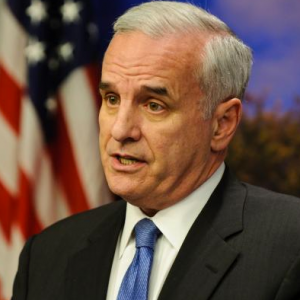 Teddy Roosevelt said “the only man who never makes a mistake is the man who never does anything.”
Teddy Roosevelt said “the only man who never makes a mistake is the man who never does anything.”
A couple years back, Governor Mark Dayton was trying to do something. He was attempting to do something that scores of other elected leaders had failed to do, after about a decade of trying. To great fanfare, he helped strike a bipartisan Vikings stadium financing deal that was passed into law. But in the process, the Governor and Legislature made a big honkin’ mistake in relying on electronic pulltabs to finance the stadium.
I don’t admire the Governor’s mistake. But mistakes happen to human beings, and I do admire two things that mistaken Dayton has done in the wake of the error.
Mistake Admitted
The first thing I admire about the Governor is that he admitted the mistake. He said the four humble words you rarely hear coming out of elected officials’ mouths — “We made a mistake.” In the Star Tribune, Governor Dayton didn’t sugar coat, blame, or make excuses:
“We made a mistake, and corrected it.”
It should be noted that the Governor didn’t say this right away. He was initially hoping that time might heal the e-pulltab wounds, and it was probably reasonable to give the new product a bit of time to develop a following. But he did admit the mistake quickly enough to keep the stadium project on track, and that’s something that modern politicians almost never do any more.
Admitting mistakes is a core competency voters need to demand from elected officials. Mistakes are inevitable for any leader, and admitting them is the sign of a courageous, constructive and honest leader, not a weak one. After all, mistakes usually don’t get fixed until they’re identified and owned. If we don’t have leaders who are willing to do that, we’ll be stuck with a government focused on cover-ups, mop-ups and work-arounds.
Correct Lesson Learned
The second thing I admire about the Governor’s admission is that he learned the correct lesson from the mistake. Errors present teachable moments where leaders can learn the wrong or right lessons. Wise leaders learn the right lessons.
As I wrote a while back, the right lesson here is NOT that private sector fiscal input is always evil or incompetent, or that anything that the Vikings owners’ endorse must be rejected on its face. These are the conclusions that a lot of stadium critics have been pushing, and they are rash and wrong.
Fiscal analysts would be foolish to reject private sector vendors’ input as part of their analysis. Just because they were spectacularly wrong in this case doesn’t mean that they shouldn’t be used. History shows that private sector input is one important element, among many others, of good policymaking.
Governor Dayton learned the correct primary lesson from his misstep:
“To take an untried source of revenue for the sole source of funding for a major project is ill-advised. That’s my number one take-away from this.”
When it comes to new revenue sources derived from the sales of a product that is completely new to the marketplace, all public and private analysts are guessing. They aren’t guessing because they are incompetent, lazy or corrupt. They are guessing because there is no historical consumer demand data to inform sound fiscal analysis. That is why a virgin revenue source should never have been used by the Governor and Legislature, not because the Wilfs and pulltab vendors are necessarily scoundrels intent on scamming taxpayers.
Admit the mistake promptly, and learn the right lesson. In a system run by mistake-prone human beings, that’s the best we can expect of any leader.
– Loveland
Note: This post was featured in Minnpost and in Politics in Minnesota’s Best of the Blogs.

“To take an untried source of revenue for the sole source of funding for a major project is ill-advised. “That’s my number one take-away from this.”
A shame he didn’t listen at the time.